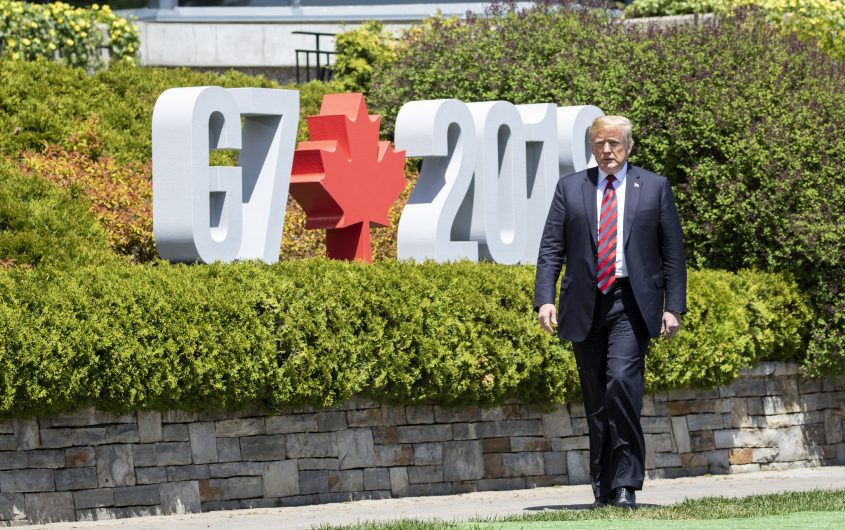
Official White House Photo by Shealah Craighead via Flickr
Trump Bobbles the G7 Summit

Peter S. Rashish
Vice President; Director, Geoeconomics Program
Peter S. Rashish, who counts over 30 years of experience counseling corporations, think tanks, foundations, and international organizations on transatlantic trade and economic strategy, is Vice President and Director of the Geoeconomics Program at AICGS. He also writes The Wider Atlantic blog.
Mr. Rashish has served as Vice President for Europe and Eurasia at the U.S. Chamber of Commerce, where he spearheaded the Chamber’s advocacy ahead of the launch of the Transatlantic Trade and Investment Partnership. Previously, Mr. Rashish was a Senior Advisor for Europe at McLarty Associates, Executive Vice President of the European Institute, and a staff member and consultant at the International Energy Agency, the World Bank, UN Trade and Development, the Atlantic Council, the Bertelsmann Foundation, and the German Marshall Fund.
Mr. Rashish has testified before the House Financial Services Subcommittee on International Monetary Policy and Trade and the House Foreign Affairs Subcommittee on Europe and Eurasia and has advised three U.S. presidential campaigns. He has been a featured speaker at the Munich Security Conference, the Aspen Ideas Festival, and the European Forum Alpbach and is a member of the Board of Directors of the Jean Monnet Institute in Paris and a Senior Advisor to the European Policy Centre in Brussels. His commentaries have been published in The New York Times, the Financial Times, The Wall Street Journal, Foreign Policy, and The National Interest, and he has appeared on PBS, CNBC, CNN, NPR, and the BBC.
He earned a BA from Harvard College and an MPhil in international relations from Oxford University. He speaks French, German, Italian, and Spanish.
The Group of Seven, or G7, can seem like a creature of the late twentieth century, with its rich-country, Europe-heavy membership. China and Russia are absent, but so are democracies like India, Mexico, South Korea, Brazil, and Australia. But until something is found to replace it, the G7’s like-mindedness remains valuable—especially as a way to help keep the UK close to its three EU members (France, Germany, and Italy) after Brexit.
This year the United States holds the chair of the G7. The role can be seen as a relay, with France, last year’s chair, handing off the baton to the U.S. and saying “here, your turn to lead.” Instead, in the ten months since the White House announced and then quickly retracted the idea that the summit would take place at the Trump Doral resort in Florida, the administration has continued to bobble its handling of the G7.
In March, the White House announced that an in-person G7 summit would not be held because of the coronavirus. In its place the G7 held an April video call solely to discuss pandemic relief efforts. Then in May, Trump reversed course and tweeted that he wanted to host the gathering in Washington or at Camp David, to demonstrate that the U.S. was returning to normal despite COVID-19. After German chancellor Angela Merkel declined the invitation (owing to the still difficult public health conditions), the president decided to postpone the event until September and announced his desire to invite Russia to take part.
This week Trump pivoted again, saying he wants to wait until after the election to hold the G7, when there will be a “calmer atmosphere.”
Trump’s clumsy, on-again off-again handling of the G7 is instructive. The G7 summit is the first time the current administration has had the leadership of an international forum thrust upon it. Since Trump has been in the White House, it has been the turn of other capitals to host summits for NATO and the G20, two other important, rotating gatherings of heads of state and government. Now, with the world waiting on Washington, Trump has been unable to make up his mind what to do.
Now, with the world waiting on Washington, Trump has been unable to make up his mind what to do.
Normally, political leaders welcome the opportunity to put their stamp on the annual G7 agenda. It gives them a chance to demonstrate mastery of complex international issues, and to bank some political points by shining—if only briefly—in front of a domestic audience. Trump’s mercurial approach, by contrast, seems to indicate that he views G7 leadership as an imposition.
And that should not be surprising. The entire thrust of his administration has been to try to assert U.S. national interests by withdrawing the country from important parts of the international arena—the Paris climate accord, the World Health Organization, UNESCO—or by disrupting the functioning of others, like NATO (moving nearly a third of U.S. troops out of Germany) and the WTO (neutering its dispute settlement system).
But while his administration has sought to project power by exiting shared global stages, Trump himself relishes an audience. In the end, the president split the difference: he called attention to his role as G7 chair by regularly changing plans for the gathering, while at the same time avoided convening the summit, which would have undercut his administration’s message of strength through isolation.
Next year it will be the UK’s turn in the G7 chair. Fortunately, Prime Minister Boris Johnson is likely to want to host a sober and well-planned summit to help put the country’s Brexit turmoil behind it.








